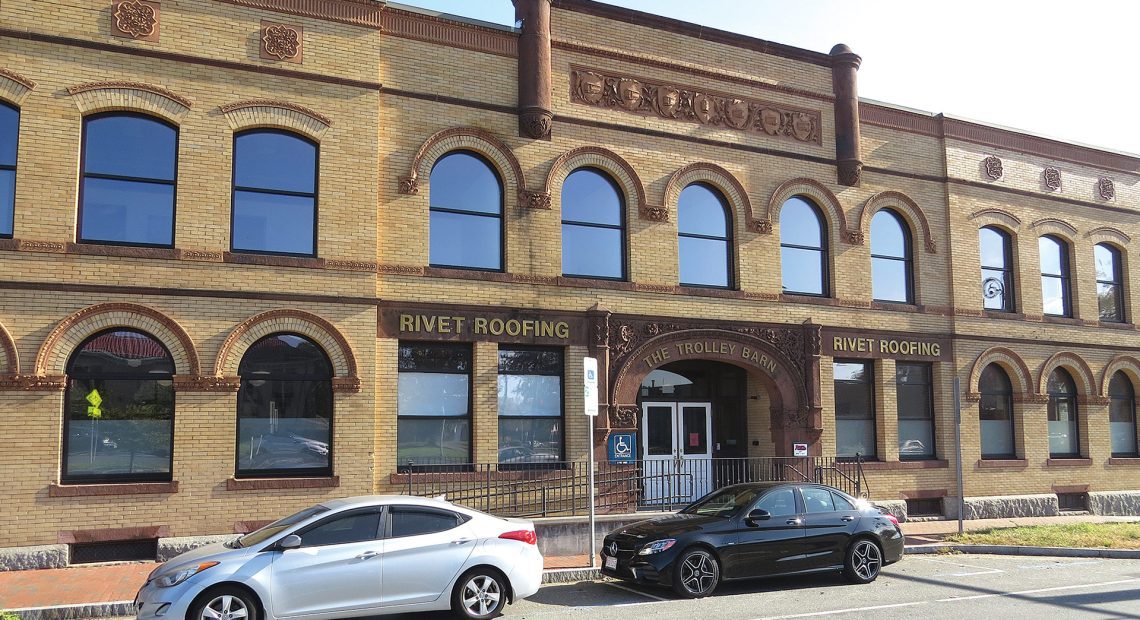A Blast from the Past
Springfield’s Trolley Barn, the property at the corner of Main and Carew streets, has had an important place in the city’s history since it opened back in 1897. It was long home to the Springfield Street Railway Co. and, later, Peter Pan’s Coach Builders operation. Today, it has a new life as home to J.D. Rivet, a roofing and sheet-metal company, thus ensuring that this link to the past will have a place in the city’s future.
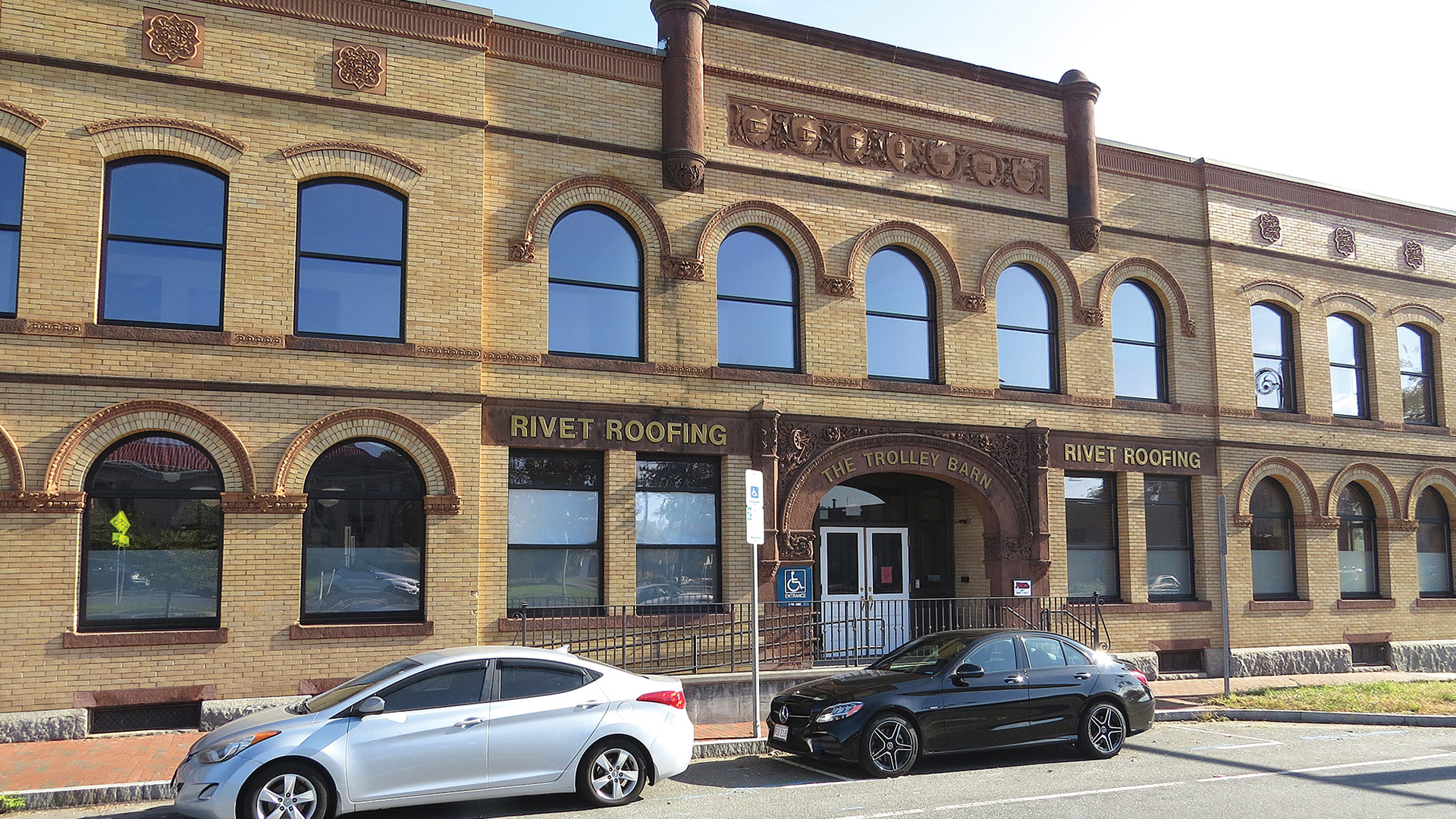
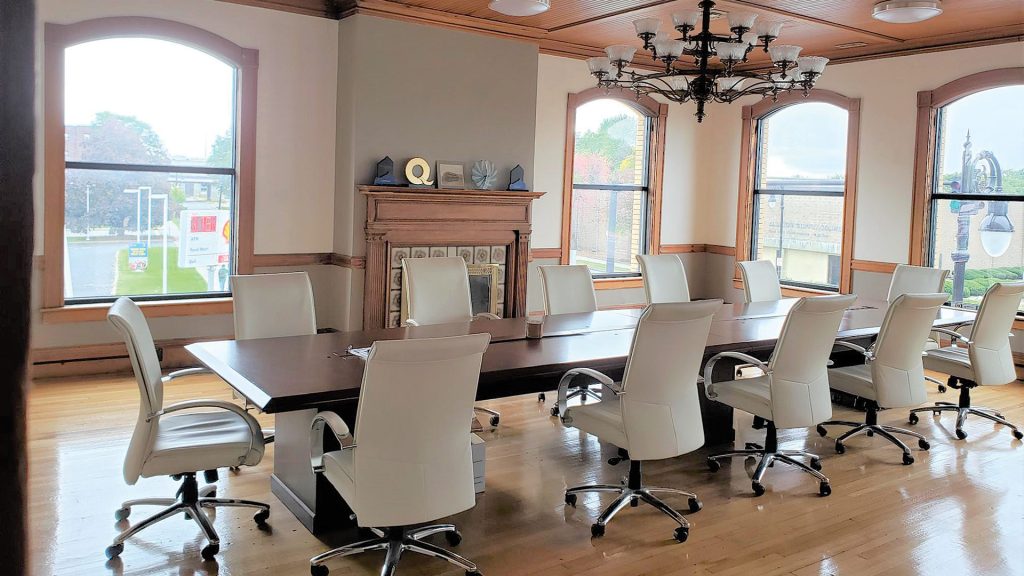
At top, the Trolley Barn sign is joined by others announcing the newest owners. Above, past and present come together in the second-floor conference room.
Jim Trask says the search took the better part of four years.
That’s because, as he and other members of the leadership team at JD Rivet & Co. Inc., a roofing and sheet-metal company, went about looking for a new home to replace the one on Page Boulevard in Springfield, they had a lot of boxes that needed to be checked.
Chief among them was — and is — location, said Trask, the company’s president, adding that several crews hit the road for jobs each day, and easy access to highways is a major consideration. But there were others, including large open space for a warehouse, parking, and more, as the company, working with a broker, considered a number of options, including property at the Deer Park Industrial Park in East Longmeadow.
Eventually, the search ended at a rather intriguing place, the corner of Main and Carew streets in Springfield, home for nearly 125 years to a building known as the ‘Trolley Barn.’
“That’s a nod to the days when there were actual stables for horses that would pull carriages,” said Trask, adding that the property certainly has seen a great deal of history and change; from the horse-drawn cars to the electrically powered trolleys of the Springfield Street Railway Co., to far more recent uses. These include it being home to Peter Pan Bus Lines’ Coach Builders repair and restoration facility, and, simultaneously, a methadone clinic in the front-office section of the facility.
Trask and Sean Gouvin, the company’s vice president, recalled that, when they were first introduced to the property by Brendan Greeley, a broker at R.J. Greeley Co., they saw both opportunity and challenge, in perhaps equal amounts.
The former was represented by those aforementioned boxes being checked, especially the location part; the property is just a few hundred feet from an on-ramp to I-91, a few blocks from I-291, and a just a few minutes from the Mass Pike. The latter came in the large amount of work that needed to be undertaken to ready the property for the planned new use, especially transforming the portion occupied by the methadone clinic into modern office and warehouse space.
“I liked the building — I could tell it was really strong,” Trask said. “I loved the space in the warehouse, but the office at the time was all broken up and I didn’t really like the office space at all.”
Eventually, though, they decided seizing the opportunity was worth the challenge. Thus commenced more than six months of cleanup and restoration work that yielded some surprises — sheetrock was covering original brick and intricate woodwork in that office area — as well as a few artifacts, and a workspace that speaks to the early 20th century but certainly works in the early 21st century.
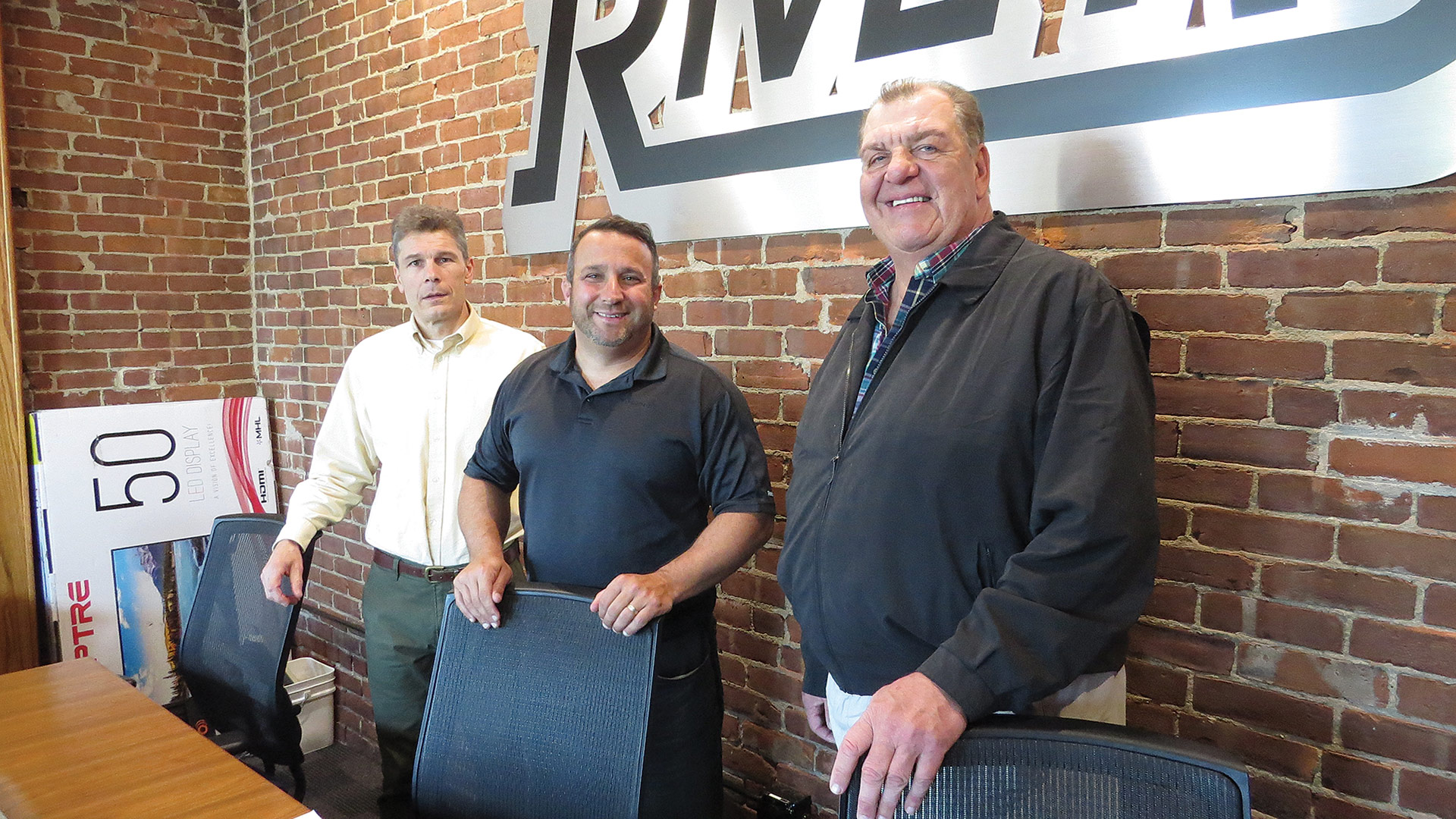
At left, from left, Robert Ostrader, Sean Gouvin, and Jim Trask in the new first-floor conference room.
“There are a lot of reasons why we’re here — location, price, everything,” Trask said. “But I love old buildings, and this is one of the most historic buildings around.”
And it provides what the company needs most — a long-term solution to its space needs, he added, noting that JD Rivet has worked through the many hurdles created by the pandemic (although some stern challenges remain, especially supply-chain issues) and is in a growth mode.
Founded in 1960, the company specializes in the installation and maintenance of commercial, industrial, and residential roofing systems. The company has worked on everything from churches to hangars at Westover Air Reserve Base.
From its new headquarters in Springfield’s North End, it can see the past — and the future as well.
Pulling Out All the Stops
As for those artifacts … there are several of them, including old pictures of the trolleys that were once housed there (one now graces the second-floor conference room), a boiler alarm bell (just like it sounds, it’s a bell that would ring if there was a problem with the boiler) that dates back to the turn of the 20th century, and some old fire-insurance maps, found on the property, that offer a glimpse of the dramatic growth that came to that section of Springfield in the early 1900s.
These items would be considered a bonus, said Bob Ostrander, JD Rivet’s chief financial officer, adding that what the company really wanted from its new home was a chance to consolidate operations — it was spread out in several different buildings on Page Boulevard — as well as have better, easier access to highways and that room to grow.
“The office was so chunked up, you couldn’t really get a feel for what it was because you couldn’t see more than a few feet without a wall.”
It got all that and more at an address — Carew and Main — that has seen a lot of history and certainly changed with the times. Indeed, the owner for decades was the Springfield Street Railway Co., which opened in 1870, and originally operated a single line of track — served by four cars and 24 horses — that ran from the North End of the city down Main Street, past State Street.
The original line soon expanded to other parts of the city, and by 1891, the lines were all electrified to run trolleys. By the end of the century, the network had extended to several area communities, and connections were made to other networks in other cities, including Holyoke, Westfield, Northampton, and Hartford. To handle all this growth, the company built the facility, named the Trolley Barn, at the corner of Main and Carew.
Like all trolley lines, Springfield’s became obsolete in the 1950s as cars and buses became the dominant modes of transportation. The Trolley Barn would eventually be acquired by Peter Pan Bus Lines to house its Coach Builders operation, which painted and repaired buses.
When the management team at JD Rivet first looked at the property, Coach Builders was still occupying the large area formerly used for housing and maintaining trolleys, and a methadone clinic had recently moved out of the office portion of the property. That later operation required privacy for its clients, said Ostrander, adding that the relatively large area had been carved up into many smaller spaces covered by sheetrock.
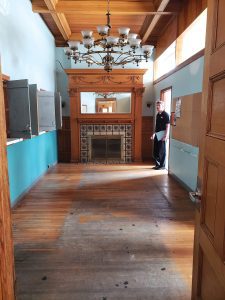
Before-and-after shots of the office area show the amount of work needed to restore the historic Trolley Barn to its former luster.
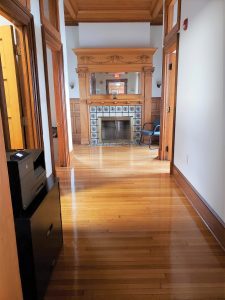
“The office was so chunked up, you couldn’t really get a feel for what it was because you couldn’t see more than a few feet without a wall,” he said, adding that their collective imaginations managed to see through all that. And they liked what they saw.
“We had a demolition contractor, Associated Builders, come in and tear down all that sheetrock, and when they did, it revealed all this beautiful wood,” he told BusinessWest, waving his hand across the space that has become his office. “So we decided to restore all that wood — the floors, the wainscoting on the walls, the ceilings, the doors.”
Only small portions of those hardwood floors could not be fully restored, said Ostrander, adding that the company has effectively blended the past — specifically those floors, walls, and ceilings — with the present, including a new, glass-walled conference room created on the ground-floor office area.
Gouvin agreed. “From the beginning, we treated it as historic renovation — every turn was thoughtful,” he said of the efforts to preserve historic qualities of the property (and there are many of them), yet make the property suitable for modern office and warehouse operations.
Elaborating, he said the structure is in a historic district, so any alteration to the building that faces Main Street had to be approved by the Historic Commission. That includes the windows and the front door, which had to be restored and not simply replaced.
The past and present come together in a number of spaces within the building — the warehouse still bears evidence of where trolley cars were kept and maintained, but the there’s now high-efficiency lighting there and elsewhere — but perhaps none better than the second-floor conference room, which takes advantage of large windows, more of that ornate woodwork, and a fireplace (one of several in the building) to provide a unique, homey setting.
“I don’t think we’ve had to turn the lights on in there yet — the windows let in a ton of light,” said Trask, adding that it’s the same throughout the office portion of the property.
Past Is Prologue
The business cards for those at JD Rivet list 2257 Main St. as the address.
That’s a location steeped in history, one that brings three different centuries together in the same building.
Those at the company are proud of how they’ve blended the past with the present. But mostly, they’re excited about the future and the opportunities presented by this new facility.
George O’Brien can be reached at [email protected]



